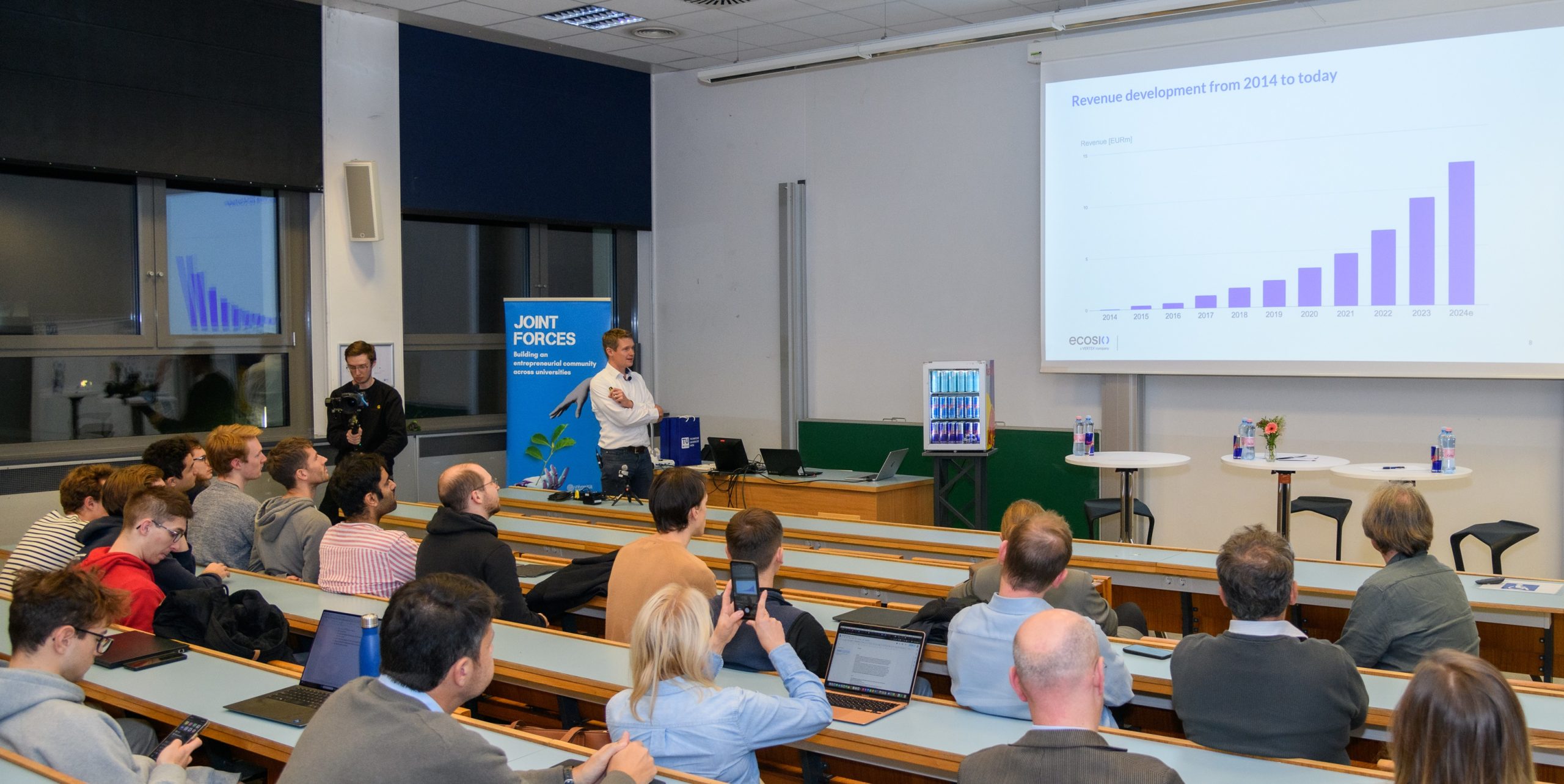
At Pioneer Tomorrow on October 23rd, ecosio founders Christian Huemer and Christoph Ebm shared their experiences and advice on building and selling a company.
What does it take to take an idea from research to 180 million dollar exit?
Christian Huemer and Christoph Ebm shared insights into the journey of ecosio, from its inception to its recent acquisition by Vertex Systems, at our latest Pioneer Tomorrow event. The company, which specialized in EDI (Electronic Data Interchange) solutions, was successfully sold in early 2024, marking one of the larger exits in the Austrian startup ecosystem.
The roots of ecosio and pioneering EDI
Christian Huemer described ecosio’s beginnings as a complex series of “well-designed coincidences,” tracing the company’s roots back to the 1990s when he began working on EDI standards in Austria. “You can’t plan everything,” Huemer reflected, noting the incremental steps from his early research to the eventual foundation of ecosio. Over time, he and his co-founders Philipp Liegl and Marco Zapletal realized realized that their EDI solution goes beyond the usual interface to ERP systems. A research proposal for a funding program by FFG was rejected, leaving Huemer no other option than to start a company: “The game is surviving in the market in the beginning. And for that it was necessary for the academic to step down.”
So Huemer handed over the task of turning their EDI solution into a company to co-founders Philipp Liegl, Marco Zapletal and Christoph Ebm. “You have to be naive in the beginning,” Huemer reflected on the early days, “do you really believe that a startup is trusted with business-critical infrastructure?” Despite these initial challenges, they secured their first customer in 2012.
Growing the company
The company was officially incorporated in 2013. For Ebm, ecosio’s journey has been about “challenging the status quo” in EDI, an ethos that he believes is key to unlocking the full potential of data interchange for clients. “Our USP was not just in selling EDI, but in selling connections that work,” he explained, highlighting the need for a service-oriented platform to build reliable client networks. Ebm credited his co-founders’ skill in securing research funding and seed money for enabling the company’s early growth. “If I could do one thing differently,” he admitted, “it would be to approach sales completely differently than we did. We also learned that team fit above all is critical.”
Discussions about a potential acquisition began two years ago, when ecosio first planned to partner with US software company Vertex. When Vertex showed interest in buying the Austrian company, Ebm initially declined. But given the difficult market conditions, the co-founders realised that they needed to partner with a larger player in the market that would complement them perfectly. The deal was announced in summer 2024 and it’s one of the biggest startup exits in Austria.
Discussing the emotional aspects of the exit, Ebm shared: “The much more emotional part was letting go of being an owner of a company. It was like a child going to college situation.” Ultimately, Vertex’s shared values and complementary products made the decision easier.
Role of TU Wien
The university played a crucial role in ecosio’s success. “TU was incredibly helpful. In the very beginning, we didn’t have an office space, that kept us running, kept costs low,” Ebm acknowledged. The Austrian funding ecosystem for high-tech startups also proved vital, with the company receiving seed money from 2014 to 2017 before securing friends and family investments and their first institutional investor.
As for the future, Huemer mused on potential roles as a business angel or advisor. Ebm, too, hinted at a willingness to reinvest his knowledge, though he’s hesitant about formal venture capital. “It would need to be something where I can contribute knowledge,” he emphasized.
Advice for students and founders
Both speakers offered valuable insights for aspiring entrepreneurs: Huemer emphasized the importance of a solid business concept: “If you don’t find money for your business idea, you don’t have a good business idea – at least for high tech.”
Ebm stressed the importance of execution: “Just do it, give it a try, it’s a hell of a ride, but do not underestimate sales.” He also emphasized the crucial nature of team fit: “Don’t take team fit lightly. If somebody is not a person you like working with, it will not work.”
The company’s success story, culminating in its acquisition by a NASDAQ-listed company, stands as a testament to the vibrant Austrian startup ecosystem and the potential of university spin-offs to achieve significant commercial success.
